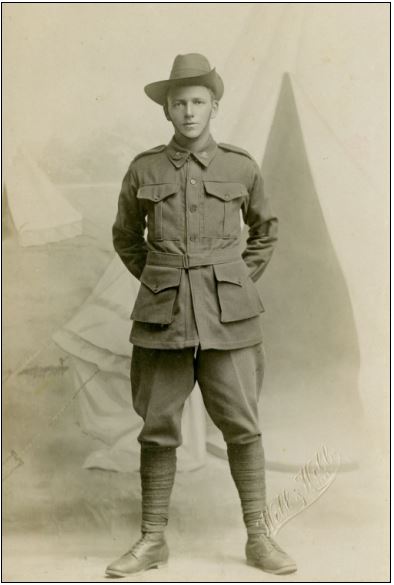Difference between revisions of "Stanley Thomas Marsh"
From Our Contribution
| Line 7: | Line 7: | ||
| − | | image = [[File:Marsh_Stanley_Thomas.jpg|border|]] | + | | image = [[File:Marsh_Stanley_Thomas.jpg|border|400px]] |
| caption = | | caption = | ||
| image2 = | | image2 = | ||
Revision as of 20:30, 11 May 2018
 | |
| Personal Information | |
|---|---|
| Date of Birth | unknown 1898 |
| Place of Birth | Wungong, Western Australia |
| Death | 1 Sep 1980, aged 81 |
| Place of Death | Armadale, Western Australia |
| Age at Enlistment | 18 years old |
| Description | 5' 10" (1.78m) tall; weight 165 lbs (74.8 kg); fresh complexion, brown eyes, brown hair |
| Occupation | farm hand |
| Religion | Church of England |
| Address | Wungong, Western Australia |
| Next of Kin | Father Mr Robert George Marsh |
| Military Information | |
| Reg Number | 3411 |
| Date of Enlistment | 10 Jan 1917 |
| Rank | Private |
| Unit/Formation | 51st Battalion, 9th Reinforcement / 13th Brigade, 4th Division |
| Date of Embarkation | 29 Jan 1917 - 27 Mar 1917 |
| Ship Embarked On | HMAT A28 Miltiades |
| Date of Return | 9 Dec 1918 - 18 Jan 1919 |
| Ship Returned On | HMAT A8 Argyllshire |
| Fate |
Wounded in Action 24 Apr 1918 2nd Villers-Bretonneux Returned to Australia |
| Monument |
Armadale War Memorial (West Armadale panel) Armadale Congregational Church Honour Board Armadale and Districts Roll of Honour |
| Medals |
British War Medal Victory Medal |
Pre War
War Service
As soon as Stanley entered camp he was allocated to the 9th reinforcement draft for the 51st Battalion, and within three weeks he was embarked for England, such was the shortage of men at that time.
On arrival in England he spent three months with the 13th Training Battalion at Codford, before proceeding to France on 25 Jun 1917 through Southampton. Stan was taken on strength by the 51st Battalion on 15 Jul 1917 while they were in the front line near Ploegsteert Wood 3 km north of the French border. Six months later he was granted UK Leave from 23 Feb 1918 to 12 Mar 1918.
In the evening of 24 Apr 1918 the battalion participated in the counter attack on Villers Bretonneux, the focus of the German attack towards the critical rail centre of Amiens. The 51st Battalion were to the north of the village, and sustained heavy casualties with 76 killed, 253 wounded and 60 found to be missing the next day. Stan's wound was caused by a machine gun bullet to his head, fracturing his skull.
Seen first by the 25th Field Ambulance on 25 Apr 1918 he was passed the next day to the 12th Casualty Clearing Station and then sent on, and admitted to the 9th General Hospital in Rouen on 28 Apr 1918. The next day he was evacuated to England aboard HMHS Essequibo.
Admitted to the 1st London General Hospital in Camberwell where he was operated on twice, in April 1918 to remove bone fragments pressing on the brain causing amongst other things paralysis of the right arm. He improved steadily after the second operation on 30 Apr 1918, including regaining some use of his arm.
Stan had recovered enough by 8 Aug 1918 to be transferred to the 3rd Australian Auxiliary Hospital at Dartford. On 2 Oct 1918 he was transferred to the No 2 Convalescent Depot to continue his recovery.
On 4 Oct 1918 he was declared to be permanently unfit for General or Home Services and 100% disabled for pension purposes. Returned via Albany on 18 Jan 1919 and admitted to the 8th Australian General Hospital in Fremantle where bone grafts were used to close the hole in his skull. Discharged from hospital on 4 Apr 1919.
Discharged 2 May 1919 at 5th Military District.
Local papers reported that Stanley Marsh of Wongong had been wounded.[1]
Post War
Electoral Roll entries - 1922 Rum Jungle, NT labourer, and Wyndham, labourer; 1925 - 1958 Mundijong, farmer; 1963 - 1977 at 18 Thomas street, Armadale, retired; 1980 16 Deerness Way, Armadale
References
- ↑ "WESTERN AUSTRALIA.". The West Australian. XXXIV, (5,040). Western Australia. 31 May 1918. p. 7. Retrieved 20 July 2017 – via National Library of Australia.